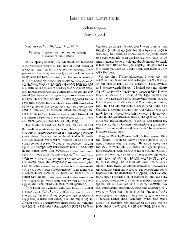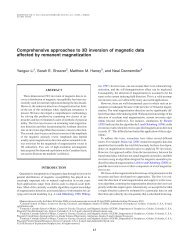Chapter 9 - Instructional Media: Chalkboards to Video - CGISS
Chapter 9 - Instructional Media: Chalkboards to Video - CGISS
Chapter 9 - Instructional Media: Chalkboards to Video - CGISS
Create successful ePaper yourself
Turn your PDF publications into a flip-book with our unique Google optimized e-Paper software.
<strong>Chapter</strong> 13 — Grading<br />
This chapter discusses grading philosophies, presents suggestions that will help <strong>to</strong><br />
maintain fairness and consistency in your grading, and discusses issues that should<br />
be addressed in course planning.<br />
• Grading Philosophies<br />
• Purposes Served by Grades<br />
• Types of Grading<br />
• Attributes of Grading Methods<br />
• Evaluating Performance<br />
• Other Grading Considerations<br />
• Fairness in Grading<br />
• Rights of Student and Instruc<strong>to</strong>r<br />
• Writing Assignments and Their Evaluation<br />
• Checklist for Designing Writing Assignments<br />
• Sample Explanations of Grades Given for Writing Assignments<br />
• Analytic and Holistic Scoring on Writing Assignments<br />
• Suggestions -- When Grading Writing<br />
• Designing Essay Assignments and Writing Projects<br />
• Resources on Student Assessment<br />
Grading<br />
Philosophies<br />
Grading is a major concern <strong>to</strong> both new and experienced<br />
instruc<strong>to</strong>rs. Some are quite strict at the beginning <strong>to</strong> prove that<br />
they are not pushovers. Others, who may know their students<br />
personally, are quite lenient. Grades cause a lot of stress for<br />
undergraduates; this concern often seems <strong>to</strong> inhibit enthusiasm<br />
for learning for its own sake (“Do we have <strong>to</strong> know this for the<br />
exam”), but grades are a fact of life. They need not be<br />
counterproductive educationally if students know what <strong>to</strong><br />
expect.<br />
Grades reflect personal philosophy and human psychology, as<br />
well as efforts <strong>to</strong> measure intellectual progress with objective<br />
criteria. Whatever your personal philosophy about grades, their<br />
importance <strong>to</strong> your students means that you must make a<br />
constant effort <strong>to</strong> be fair and reasonable and <strong>to</strong> maintain grading<br />
standards you can defend if challenged.<br />
College courses are supposed <strong>to</strong> change students; that is, in some<br />
way the students should be different after taking your course. In<br />
the grading process you have <strong>to</strong> quantify what it is they learned,<br />
and give them feedback, according <strong>to</strong> some metric, <strong>to</strong> how much<br />
they learned.<br />
The following four philosophies of grading are from instruc<strong>to</strong>rs at<br />
FSU. Which is closest <strong>to</strong> your philosophy<br />
Section: Student Assessment 188 <strong>Chapter</strong> 13: Grading
















